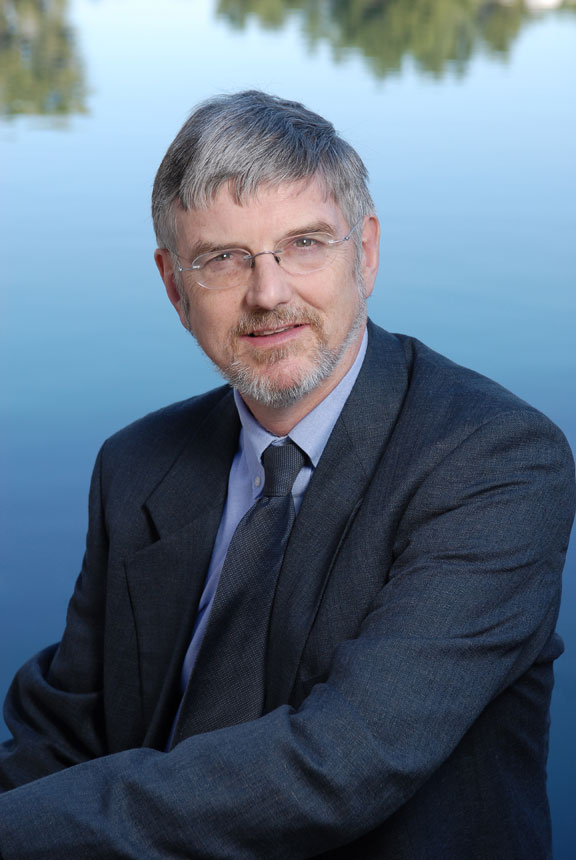Water institute truly global
The Global Institute for Water Security marked its first anniversary on International Water Day, March 22, and is proving, as the name implies, its research scope is far reaching—from as close to home as the South Saskatchewan River Basin, to as far away as Bangladesh, Pakistan and India.
By Kris Foster
"Water is such a big issue, both in terms of quality and quantity," said Howard Wheater, who, about a year and a half ago, left his position at the Imperial College in London, England to become the institute's director and step in as the Canada Excellence Research Chair in Water Security at the U of S. "Unsustainable use is linked to increasing population, rapid environmental change and changing climate. The future of water is uncertain and we need to balance competing demands."
As Wheater works to strike that balance, he has "picked up some interesting jobs," including an appointment to the Alberta Environment Monitoring Panel to provide advice on establishing a monitoring and evaluation system for the Alberta oil sands, and membership on the International Court of Arbitration regarding the Indus Waters Treaty between India and Pakistan.
Later this year, another project will land Wheater in Bangladesh where he will investigate a spike in the incidence of pre-eclampsia—hypertension or high blood pressure during pregnancy— "that, as a result of high salinity in drinking water, is affecting about 20 million people," he explained. "The increase in salt content in the drinking water of the delta can be traced to three main causes: ingress of seawater from higher sea level; an increase in the number of cyclones, which changed freshwater flows in the Ganges; and farmers flooding their embankments with saltwater in order to switch from rice farming to shrimp farming. It is a complex set of issues."
Closer to home, Wheater is creating connections on and off campus to further develop the network of water expertise. "We have done a lot of engagement across the university and at the Canadian Light Source, Environment Canada and Agriculture Canada. We have grown and now have 80 faculty and senior researchers in the institute, as well as our students and post-docs," Wheater said.
Wheater is finding no shortage of experts to work with on campus, particularly in the School of Environment and Sustainability, and in the disciplines of civil and geological engineering, geography, public policy, medicine, agriculture, geology, hydrology and toxicology. He has even found opportunitiesfor collaboration in history.
"I've been talking to Bill Waiser in history about historical events and what we can learn beyond the short historical records we have. Extreme events are so important," said Wheater, pointing out that within a 10-year period the prairies experienced extreme drought in 2001 and then extreme flooding—like the Souris River—in 2011. "You might expect to only see these extremes every 500 years."
Bringing all this expertise together allows the institute to "identify strategic needs and develop teams and research plans. It's a big science program. We are building up research sites all across the prairies, from the boreal forest to Lake Diefenbaker. On top of that we are working on modelling tools to predict and explore water futures for 2050 or 2100 to reflect what we understand. We are turning science into decision making tools."
But Wheater is aware that these tools, no matter how well they predict water futures, will not work unless they are relevant socially. "We can't manage the environment without recognizing the importance of people and their values; much of our landscape and river flows have been determined by human choices. We are working in a new area (of research) we call socio-hydrology that recognizes social factors. To get a better understanding we are holding workshops from the Rockies to Cumberland House to capture how people in those areas define water security and what they value about water resources. "We can manage water flows, and science can answer questions, but how it is implemented is social and political."
It is a big undertaking and he feels "spread a bit thin most of the time," but Wheater loves it. "Water is a terrific area of study. It is totally global and there is room for pretty much anyone to work."
Canada is an ideal place for this research, explained Wheater. "Canada is well known as a water-rich nation around the world because of our lakes, rivers and groundwater, but water is a regional and local issue. There are scarcity issues that people are not aware of and water quality issues are even less known. On top of that Canada is at the forefront of global warming and is seeing glacier retreat firsthand. It is all changing and we need tofigure out how to manage it in the future to minimize adverse effects."

